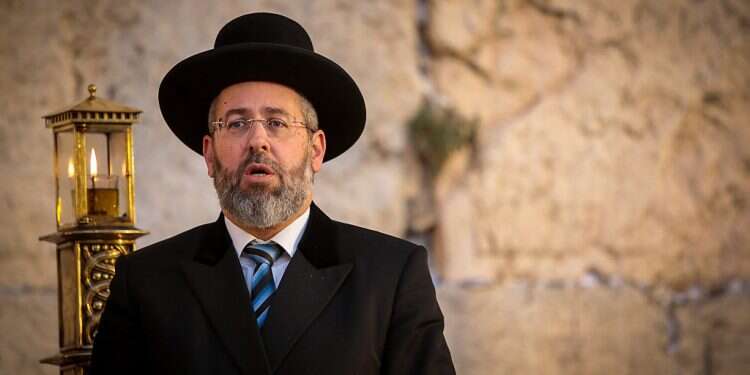Ashkenazi Chief Rabbi David Lau has come out against Religious Services Minister Matan Kahana, asserting that even if his proposed conversion reforms are passed in the Knesset, they will not determine who is Jewish in the State of Israel.
Follow Israel Hayom on Facebook, Twitter, and Instagram
In an interview with Israel Hayom, Lau said, "With all due respect, even if the Knesset determines a man with a 43-degrees Celsius (109/4-degrees Fahrenheit) fever is healthy, that doesn't make it true. And even if they legislate a law that says you don't need cement to put up a building, that won't happen. The same is true of conversion: The Knesset is not the authority that decides who is Jewish. A Jew is someone who keeps the commandments and joins the Jewish people.
He continued, "When a child is born in the US, they are American. But if a person who wasn't born in the US asks to become a citizen there, they need to cross many hurdles. Those born on a kibbutz are automatically kibbutz members, but those who want to move to a kibbutz must pass examinations and meet certain conditions," Lau claimed.
"The Jewish people are no less than the American nation or a kibbutz. There is a path from generation to generation and a line that must remain uniform. These are halachic questions, and there is only one address for them: the Chief Rabbinate. If someone is bothered by assimilation, let them change the Law of Return with just as much force and enthusiasm. According to Interior Ministry data, the vast majority of immigrants to Israel are not Jewish, so why bring them here and then tell them there is a problem? Stop it beforehand if it pains you that much. Why change a law that is halachic in its entirety instead of preventing the problem in the first place?" Lau asked.
Lau, who serves as the president of the Great Rabbinical Court, also responded to the repeated attacks from women's organizations on the rabbinical courts' failure to provide adequate solutions to divorce refusers. According to Jewish law, unless a woman is granted a divorce by her husband, she becomes an agunah, "anchored" and "chained" in her marriage without the ability to remarry.
"This is an absolute injustice," he said, noting "hours upon hours" have been invested in efforts to close such cases. "We are doing everything to find out what can be done," he said, but insisted, "When a couple lives together, and years later comes to the rabbinical court with problems, you can't say there were problems from the outset. How can you define a marriage as a mistake from the first minute?"
"I know their [the women's organizations'] agenda," he said. An attorney stands before you and delivers a speech, and you tell her she's not helping her client but in fact, doing the opposite, but she ignores [you]. She isn't interested in her client, but the statement. It's sad. They take advantage of people's hardships in their most difficult time."
Subscribe to Israel Hayom's daily newsletter and never miss our top stories!




